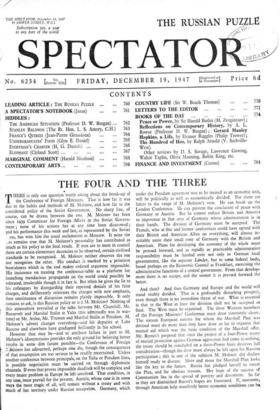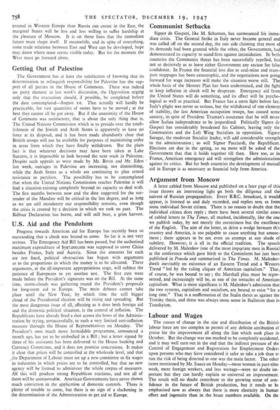THE FOUR AND THE THREE
THERE is only one question worth asking about the break-up of the Conference of Foreign Ministers. That is how far it was due to the habits and methods of M. Molotov, and how far to the considered policy of the Soviet Government. No sharp line, of course, can be drawn between the two. M. Molotov has been since 1939 Commissar for Foreign Affairs in the Soviet Govern- ment ; none of his actions has at any time been disavowed ; and his performance this week and last, as represented by the Soviet
ess, has won him the usual acclamation at Moscow. It none the
_ss remains true that M. Molotov's personality has contributed as much as his policy to the final result. If men are to meet in council there are certain elementary decencies to be observed, certain civilised standards to be recognised. M. Molotov neither observes the one nor recognises the other. His conduct is marked by a primitive boorishness which in the end makes ordered argument impossible. His insistence on treating the conference-table as a platform for launching mendacious propaganda on the world could possibly be tolerated, intolerable though it in fact is. But when he gives the lie to his colleagues by disregarding their repeated denials of his false charges, and deliberately reiterates the charges with new emphasis, then continuance of discussion remains plainly impossible. It only remains to ask, is this Russian policy or is it M. Molotov? Nothing of this atmosphere prevailed at the talks between Mr. Churchill. Mr. Roosevelt and Marshal Stalin at Yalta (this admittedly was in war- time) or Mr. Attlee, Mr. Truman and Marshal Stalin at Potsdam. M. Molotov's advent changes everything—and his deputies at Lake Success and elsewhere have graduated brilliantly in his school.
However that may be—and to attribute failure in part to M. Molotov's idiosyncrasies provides the only ground for believing better results in some dim future possible—the Conference of Foreign l'.1inisters has adjourned, perhaps sine die, though the consequences of that assumption are too serious to be readily entertained. Unless another conference between principals, on the Yalta or Potsdam lines, is possible negotiation must be carried on through diplomatic channels. If even that proves impossible deadlock will be complete and every major problem in Europe be left unsolved. That condition, in any case, must prevail for the present. Austria, whose case is in some ways the most tragic of all, will remain without a treaty and with much of her territory under Russian occupation. Germany, which under the Potsdam agreement was to be treated as an economic unit, will be politically as well as economically divided. For there are limits to the range of M. Molotov's veto. He can break up the London Conference. He can prevent the conclusion of peace with Germany or Austria. But he cannot reduce Britain and America to impotence in that area of Germany whose administration is in their hands. The division of Germany must be accepted. The French, who at this and former conferences could have agreed with their British and American Allies on everything, will almost in- evitably unite their small zone of Germany with the British and American. Plans for developing the economy of the whole must be pressed forward, and as rapidly as practicable administrative responsibility must be handed over not only to German local governments, like the separate Lander, but to some federal body, based perhaps on the Economic Council at Frankfurt, exercising the administrative functions of a central government. From that develop- ment there is no escape, and the sooner it is pressed forward the better.
And then? And then Germany and Europe and the world will stand visibly divided. That is a profoundly disturbing prospect, even though there is no immediate threat of war. What is essential is that in the West at least the division shall not be accepted as final. The West must be organised. The three Western members of the Foreign Ministers' Conference must draw constantly closer. The sixteen European nations for whom the Marshall Plan was devised must do more than they have done so far to organise that mutual aid which was the basic condition of the Marshall offer. Mr. Byrnes's proposal that since the project of a four-Power treaty of mutual protection against German aggression had come to nothing, the treaty should be concluded on a three-Power basis deserves full consideration—though the door must always be left open for Russian participation ; this is one of the subjects M. Molotov did declare himself ready to discuss. More and more the Marshall Plan looks like the key to the future. Russia has pledged herself to smash the Plan, and for obvious reasons. Her hope of the success of Communism lies in the spread of poverty and discontent. So far as they arc diminished Russia's hopes are frustrated. If, moreover, through American help manifestly better economic conditions can beA
created in Western Europe than Russia can create in the East, the marginal States will be less and less willing to suffer hardship at the pleasure of Moscow. It is on those lines that the immediate future must shape itself. If meanwhile, and in spite of everything, some trade relations between East and West can be developed, hope may dawn where none seems visible today. But for the moment the West must go forward alone.



































